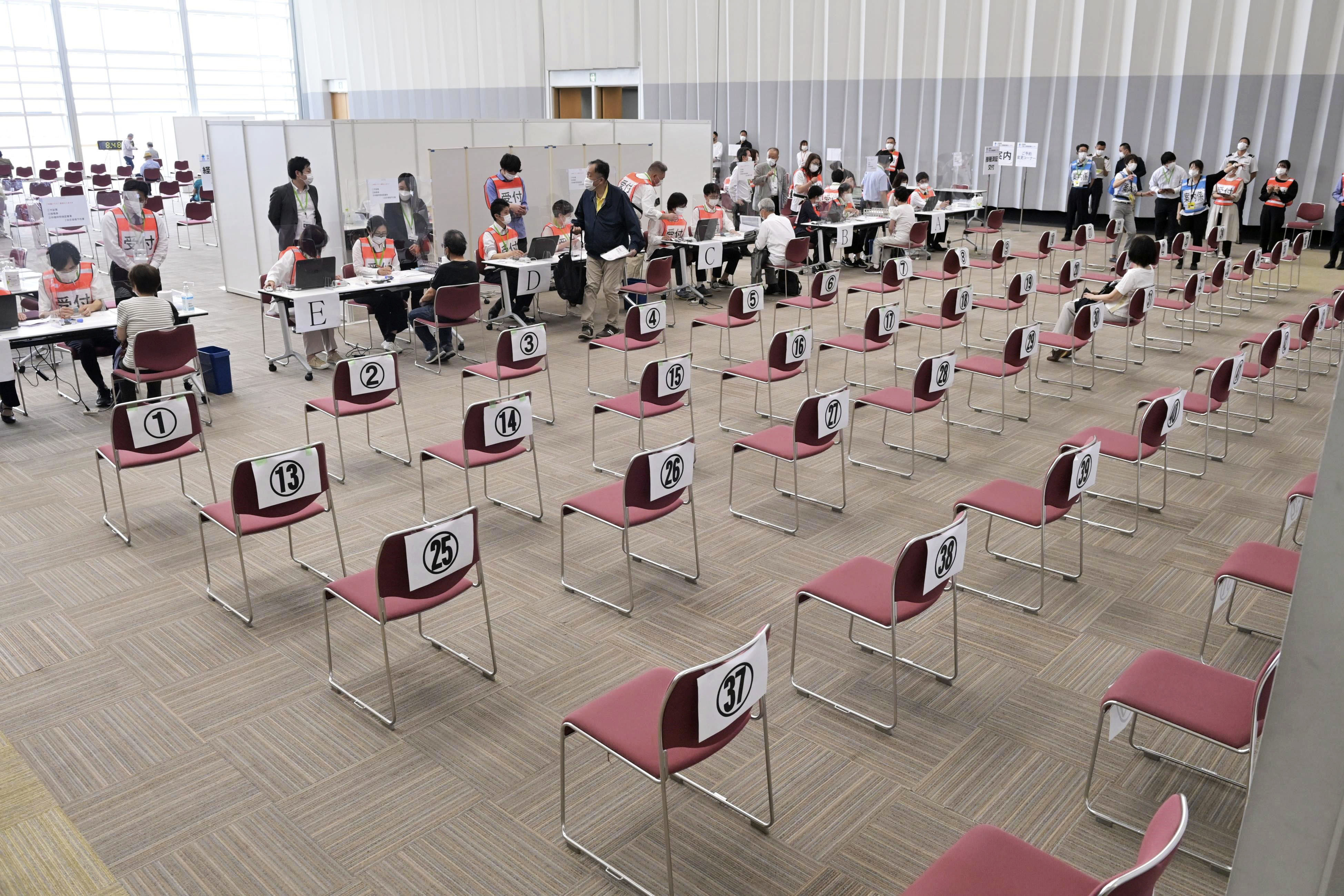Japan opens mass vaccination centres two months before Tokyo Olympics
Worries about public safety while many Japanese remain unvaccinated have prompted growing protests and calls for cancelling the Games.

Japan has mobilised military doctors and nurses to vaccinate elderly people in Tokyo and Osaka as the government desperately tries to accelerate its vaccination rollout and curb coronavirus infections just two months before hosting the Olympics.
Prime Minister Yoshihide Suga is determined to hold the Olympics in Tokyo after a one-year delay and has made an ambitious pledge to finish vaccinating the country’s 36 million elderly people by the end of July, despite scepticism it is possible.
Worries about public safety while many Japanese remain unvaccinated have prompted growing protests and calls for cancelling the Games set to start on July 23.
Mr Suga’s government has repeatedly expanded the area and duration of a largely request-based virus state of emergency since late April and has made its virus-fighting measures stricter.

Currently, Tokyo and nine other areas that are home to 40% of the country’s population are under the emergency and further extension is deemed unavoidable.
With Covid-19 cases still persistently high, Mr Suga now says vaccines are key to getting the infections under control.
He has not made vaccinations conditional to holding the Olympics and has arranged for Pfizer to donate its vaccine for athletes through the International Olympic Committee, while trying to speed up Japan’s inoculation drive as anti-Olympic sentiment grows.
At the two mass inoculation centres staffed by Japan’s Self-Defence Forces, the aim is to inoculate up to 10,000 people per day in Tokyo and another 5,000 per day in Osaka for the next three months.
In hardest-hit Osaka, where patients are overflowing from hospitals, tens of thousands of people are getting sicker or even dying at home, dozens of people lined up before the inoculation centre opened early on Monday.
In Tokyo, workers held up signs to direct vaccine recipients into the centre.
Some recipients told reporters they took taxis or shuttle buses to get to the centre and avoid packed commuter trains.
People inoculated at the centres on Monday were the first in Japan to receive doses from Moderna, one of two foreign-developed vaccines Japan approved on Friday.

Previously Japan had used only Pfizer, and only about 2% of the population of 126 million has received the required two doses.
Japan began vaccinating healthcare workers in mid-February while sticking to a standard requirement of clinical testing inside Japan – a decision many experts said was statistically meaningless and only caused delay.
Vaccinations for the next group – the elderly, who are more likely to suffer serious Covid-19 effects – started in mid-April but has been slowed by bureaucratic bumbling, including reservation procedures, unclear distribution plans and shortage of medical staff to give shots.
Completion of Japan-developed vaccines is still uncertain, but Japanese government officials hope the approvals on Friday of Moderna and AstraZeneca will help speed up the rollout.
“Speeding up the rollout makes us feel safer because it affects our social life and the economy,” said Munemitsu Watanabe, a 71-year-old office worker who got his first shot at the Tokyo centre.
“If 80-90% of the population gets vaccinated, I think we can hold the Olympics smoothly.”
Those currently eligible are 65 years or older.
Some officials say it may take until around March to reach younger generations.

But its potential for progress is unclear.
The plans for administering AstraZeneca’s shots are still pending due to concerns about the rare instances of blood-clotting complications reported elsewhere.
Johnson & Johnson applied for an emergency approval for its single-shot vaccine on Monday, and if approved, it will be ready for use in early 2022, its pharmaceutical arm Janssen Pharmaceutical said.
Japan also has a dire shortage of medical staff who can give the shots since only doctors and nurses can legally do so – and they are already busy treating Covid-19 patients.
Under pressure, Mr Suga’s government has allowed dentists and retired nurses to inoculate, and on Monday asked for pharmacists’ help.
There are worries, however, that expanding the criteria may increase vaccine hesitancy in the public.
Separately, several local governments, including Aichi in central Japan and Gunma near Tokyo and Miyagi in the north, were also to open their own large vaccination centres on Monday.





